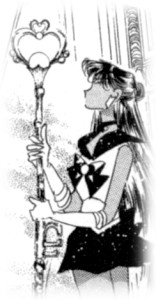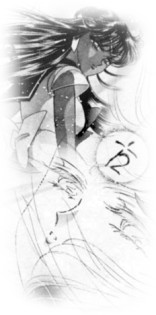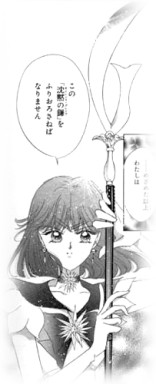
Welcome to an "AQ" subsection! This section is dedicated to the question:
Naoko's wrong! Mythology has Saturn as the god of time and Pluto as the god of death. The senshi are switched!
A puzzling question, indeed. I originally agreed with the questioner that Takeuchi-san was wrong, and tried to cover by babbling about how "meiousei," the kanji for the planet Pluto, had connotations of "memory," "destiny," and "karma" - all things that one would want a good time senshi to have. But I had no clear answer.
Flutterbye helped out by adding: "Another thing that would make Sailorpluto seem to make more sense is the fact that she is very detatched from everything else, (well, being sent to be the lone guardian of the Time Gate and all,) sort of symbolic in the fact that Pluto is the farthest planet off in the solar system... In short, she's distant, so is the planet..."
But then I got a very, very informative email from Ian Andreas Miller, who is very knowledgeable about the fields of astronomy, Japanese culture, and Greco-Roman mythology - and he explains everything. Takeuchi-san wasn't wrong, as it turns out - she is more right than we ever knew. Ian makes so much sense of the Saturn/Pluto dichotomy that I figured I'd just paste his email into here. Everything below the gray line is exactly what he told me.
Mrs. Takeuchi didn't make a mistake. This "Saturn-Pluto" mistake that Takeuchi supposedly made seems to bother those who wish to confine the themes of the characters in some astronomical or mythological straitjacket. Takeuchi took the traits of these two planets from astrology, astronomy, and mythology, and molded those traits into her Sailor Saturn and Sailor Pluto characters. The confusion mainly comes from the mistranslations of Sailor Saturn and Sailor Pluto's titles into
English from Japanese. People also tend to not fully understand the roles of the two deities Saturn and Pluto in mythology and astrology.
"Saturn and Pluto: Why Takeuchi Made the Right Choices"
* Astrologically, both the planets Saturn and Pluto have been said to be associated with death and time. This is because both are said to be the rulers of karma. This is analogous to Sailor Mercury and Sailor Neptune's associations with water: both Mercury and Neptune wield the powers of liquids. It's also interesting to take into account the fact that both Saturn and Pluto were associated with fertility in classical mythology. Though the astrological themes of Saturn and Pluto often overlap, there are some important differences.

* Sailor Pluto has been referred to in Japanese as the "meikai no bannin" which means guardian of the underworld. In classical mythology, Pluto was the Roman version of Hades, the ruler of the underworld. Pluto and Hades were associated with the underworld, not Saturn or his Greek counterpart, Cronus.
* Sometimes Sailor Pluto is referred to as the "jiku~ no senshi," the soldier of space-time. This is a reference to the "ruler of karma" role of Pluto in astrology. Sailor Pluto's most common title is "henkaku no senshi" which means soldier of change. (The basic idea of the Japanese word "henkaku" is "change.") Astrologically, Pluto is the planet of change and transformation.
* In classical Greek mythology, according to one version of the story, Erebus, the deity that personified the darkness of the underworld, was the father of the Moerae, the Fates: Lachesis, Clotho, and Atropus. These sisters were goddess of the past, present, and future, which makes them goddesses of time. This version of the story directly associates the underworld with time.
* In astrology, the planets and Zodiac signs have been assigned specific types of gems. Often, the gem associated with a planet is different from the gem associated with its Zodiac sign. The gems associated with Scorpio are topaz and opal. On the other hand, one of the gems that has been assigned to Pluto is garnet. Nothing is set in stone, however, and one might see variations of these gem lists.
* In the Sailor Moon Another Story RPG for Super Famicom, we're told that Hotaru's favorite gem is fluorite. This is neither an astrological nor astronomical reference to the planet Saturn. Instead, it's a reference to her name and to one of the names of the gem in Japanese, "hotaruishi," the "firefly stone."

* Sailor Pluto claims that she is the daughter of the deity of time, Chronos. The Greek word for time, and the deity that personifies the concept of time, was called Chronos. At one point, some philosophers stated that Chronos was the same as Cronus, the scythe-wielding harvest deity who was father of Zeus. Since then, unfortunately, some have confused the two because their names sound so much alike. It's important to remember that these two were originally very different, and in Hesiod's Theogeny, Cronus' name is written "Kronon."
* Whenever the term "Chronos" appears in the manga next to a Kanji, the Kanji for "time" is always used. Takeuchi makes a distinction between Chronos, the deity of time, and Cronus, the father of Zeus. If Takeuchi meant Cronus, the harvest deity, she would have used the Kanji that's used for Saturn ("soil") instead of the Kanji for "time." If Takeuchi really did use the "soil" Kanji to refer to the deity of time, it would have been a true error on her part.
* Some fans forget that some of Sailor Pluto's powers have to do with death and darkness. Her "Dead Scream" and "Dark Dome Close" are two maneuvers that don't specifically mention her powers over time. Setsuna's surmame, "Meio~," means "dark king" which refers to Pluto. Pluto, in Japanese, is "Meio~sei," the "dark king star."
* Interestingly, the "mei" in "Meiousei," the Japanese name for the planet Pluto, can mean "fate" or "destiny" when written with a different Kanji. If it is intended to be a play on words, then the planet Pluto could be called either the "dark king star" (its original and true meaning) or even the "fate king star." If this is true, then this new name would be an obvious reference to Pluto's associations with karma, fate, destiny, and of course, time.

* Sailor Saturn's Silence Glaive is often referred to as the "chinmoku no kama" which means "scythe of reticence." The word "saturnine," which is etymologically related to Saturn's name, can mean "silent" or "taciturn" or "reticent." The Silence Glaive is reminiscent of the scythe that Saturn and Cronus wielded in classical mythology.
* In the Sailor Moon manga, the planet Saturn has been called the forbidden planet. In astrology, Saturn has had a very long history of being thought of as a malefic planet. Moreover, it's been associated with death and destruction centuries before Pluto was discovered. Historically, if there was a forbidden planet, it's Saturn.
* Incidentally, Sailor Saturn has never been called the "shi to saisei no senshi," the soldier of death and rebirth. Her most common title is "hametsu to tanjo~ no senshi," the soldier or ruin and birth. Her "ruin" associations come from astrology, and her "birth" associations are reminiscent of Cronus and Saturn's roles as fertility deities.
* There are instances when Sailor Saturn seems to have some connections with time, fate, and destiny. Using the power of Sailor Saturn, Hotaru grows from an infant to an older child. Astrologers say that Saturn governs the body's aging process. In the manga, the soldiers of the outer solar system say that "The time when Sailor Saturn awakens is the
time of the death of this world. The time of the ruin of this world" because, according to Sailor Saturn, "Everything was set up by fate."
* Conclusion: Though the planets Pluto and Saturn are associated with time and death, there is no way that Sailor Pluto could be the one to carry the Silence Glaive (the scythe of reticence), and there's no way that Saturn Saturn could be the guardian of the underworld. In other words, if Takeuchi were to have switched Sailor Saturn and Sailor Pluto's roles completely, she would have made many astronomical and astrological errors. Well done, Mrs. Takeuchi!
Return to AQ
|